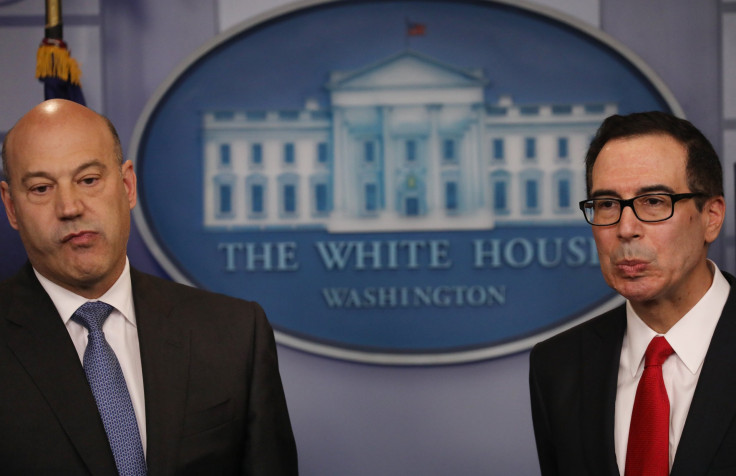How Changing Corporate Tax Rates Affects The Economy, Government Revenue

Discussions of tax reform — particularly the corporate sort — tend to revolve primarily around a single number: the statutory rate, which now sits at 35 percent on the federal level. (President Donald Trump would like to reduce it to 15 percent, while other White House officials recently suggested a rate of 20 percent.) A new study of state corporate taxes, however, suggests that lawmakers are far better off turning their attention to the credits and other loopholes that leave governments with dwindling revenues, forcing them to turn instead to sales taxes, personal income taxes and other levies paid by consumers.
The misplaced attention on rates, said Juan Carlos Suarez Serrato, a Duke University assistant professor of economics and one of the study’s two authors, is an issue on which those on both sides of the aisle could easily find common ground, at both the federal and state levels.
Read: As Mnuchin Discusses Tax Reform, Business Groups Lobby To Shape Tax Policy
“People on the right would say, ‘If we have a big tax cut, that would lead to a lot of economic activity,’ but if you have a lot of deductions already, a change in the corporate tax rate isn’t going to change economic activity,” he told International Business Times. Getting rid of some obscure kinks in tax structures across the U.S. — such as so-called “nowhere income,” in which profits of a company with sales in multiple states are attributed to no states at all and consequently go untaxed — “would have broad support across the political system,” he said.
As the average state corporate tax rate has essentially remained stagnant at between 6 and 7 percent from 1980 to 2012, state corporate tax revenues have fallen to an average of less than 3 percent of state gross domestic product from nearly 5 percent of state GDP over the same period, according to the study, published in the National Bureau of Economic Research this week. Meanwhile, states increased their corporate rates 205 times and enacted 76 decreases, but narrowed the amount of firms’ incomes liable for taxation on 293 occasions, while widening tax bases only 153 times, between 1980 and 2012. And although politicians, including members of the Trump administration, often pledge to close loopholes when they cut taxes, the study found that those two measures rarely happen simultaneously.
“Overall, changes in state tax bases have made the state corporate tax system more generous towards corporations, and are reducing the extent to which tax rate increases raise corporate tax revenue,” wrote Suarez Serrato, along with his co-author Owen Zidar, an assistant professor at the University of Chicago Booth’s School of Business. In contrast to earlier research focused on international tax structures, they added, “we find that state tax rate changes are not often offset by base and credit changes.”
Because how much state governments receive in corporate taxes depends far more on how much profit is tax-liable, as opposed to the rate on which that profit is taxed, the researchers recommended a shift in public discourse toward the closing of corporate-tax loopholes. If that doesn’t happen, they said, ordinary citizens may have to pick up the tab.
“By making it harder to raise tax revenue from corporations, it is also likely that state policymakers will be forced to raise revenue from other sources including sales taxes, property taxes, or personal income taxes, or to reduce spending in public goods,” Suarez Serrato and Zidar wrote.
Read: Trump Health Care Tax Cut Could Lead To Layoffs, Not New Jobs
As Suarez Serrato pointed out in the IBT interview, the study also highlighted the gulf between statutory and effective corporate tax rates. While the federal corporate rate stands at 35 percent and the average state rate is just over 6 percent, two studies by the Institute on Taxation and Economic Policy found that, taking loopholes into account, the effective rates are closer to 21 percent and 3 percent, respectively.
On the federal level, tax reform isn’t expected until the end of the year. But already, many groups, including the CEO advocacy organization Business Roundtable and arms of the billionaire Koch brothers’ network, have launched six-figure campaigns or spent millions on lobbying — sometimes in favor of eliminating loopholes, but almost uniformly to push for “competitive” corporate rates.
© Copyright IBTimes 2024. All rights reserved.






















